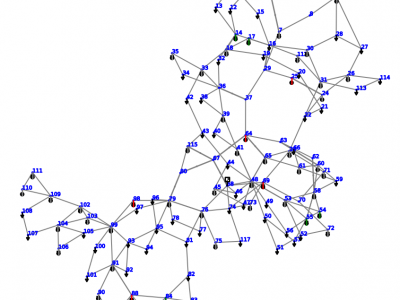*.csv
Vehicle-to-Everything (V2X) potential to support Intelligent Transportation System (ITS) is challenged by its inherent high mobility, changing topology and consequently link instability. The quest to minimize the effect of changing topology has led centroid-based clustering algorithms to exploit Cluster Head (CH) longevity approaches to improve stability while compromising on throughput performance. Most K-means based schemes particularly reselect cluster seeds at every reclustering phase.
- Categories:
 265 Views
265 Views
The dataset tracks the performance of 4 major global stock market indexes over a 5 year period from August 2018 to August 2023. It includes the S&P 500 (USA), Nasdaq 100 (USA), Shanghai Composite (China), and Taiwan Weighted Index (Taiwan). The indexes represent key benchmarks for the US, Chinese, and Taiwanese equity markets. Analysis of the dataset can provide insights into relative performance, correlations, and volatility across these major markets.
- Categories:
 649 Views
649 ViewsThe enhanced dataset is a sophisticated collection of simulated data points, meticulously designed to emulate real-world data as collected from wearable Internet of Things (IoT) devices. This dataset is tailored for applications in safety monitoring, particularly for women, and is ideal for developing machine learning models for distress or danger detection.
- Categories:
 2152 Views
2152 ViewsThe data is for time series optimal power flow analysis. It contains basic data (buses, gens, lines, loads...) to build the system, and also time series data of a peak load day and a off-peak day.
The folder "basic_case" contains data for building the system.
The folder "time series data" contains data for running time series optimal power flow.
The case is developed using the Python package "panda power".
- Categories:
 238 Views
238 Views
The dataset, developed at the National Institute of Neurology and Neurosurgery in Mexico, encapsulates crucial gait biomarkers associated with neurodegenerative diseases. This invaluable compilation serves as a comprehensive resource for understanding and analyzing the distinctive gait patterns exhibited by patients grappling with neurological disorders. By delving into these intricate biomarkers, researchers gain insights into the nuanced manifestations of conditions impacting the nervous system.
- Categories:
 236 Views
236 ViewsWe obtained this dataset as part of a project to generate a realistic speed profile on a trip specified by GPS coordinates. Specifically, we focused on generating the speed profile for a passenger car traveling on an unfamiliar route, i.e., a route the machine-learning model has yet to see.
The dataset contains 5973 rides of five different passenger cars, with a total length of 9049.3 km. The data was collected during 2021 in the Czech Republic and includes municipal and non-municipal trips.
- Categories:
 3953 Views
3953 Views
NAND Flash-based Synthetic Block IO traces from FIO benchmark is focused on understanding characteristics of flash memoy under various access patterns. The dataset comprises distinct seven wrorkloads.
Workoad 1 and 2 are sequential write workloads. Workload 1 represents the typical seuqential write pattern, while Workload 2 represents partioning sequential write pattern, dividing 8 logical partitions.
Workload 3 and 4 are random write workloads. Workload 3 follows a uniform random distribution, and Worklod 4 follows the Zipfian random distribution with a theta of 0.8.
- Categories:
 37 Views
37 ViewsPlease cite the following paper when using this dataset:
N. Thakur, S. Cui, K. A. Patel, N. Azizi, V. Knieling, C. Han, A. Poon, and R. Shah, “Marburg Virus Outbreak and a New Conspiracy Theory: Findings from a Comprehensive Analysis and Forecasting of Web Behavior,” Journal of Computation, Vol. 11, Issue. 11, Article. 234, Nov. 2023, DOI: http://dx.doi.org/10.3390/computation11110234
Abstract
- Categories:
 225 Views
225 Views
The Integrated Energy Management and Forecasting Dataset is a comprehensive data collection specifically designed for advanced algorithmic modeling in energy management. It combines two distinct yet complementary datasets - the Energy Forecasting Data and the Energy Grid Status Data - each tailored for different but related purposes in the energy sector.
- Categories:
 4233 Views
4233 Views



